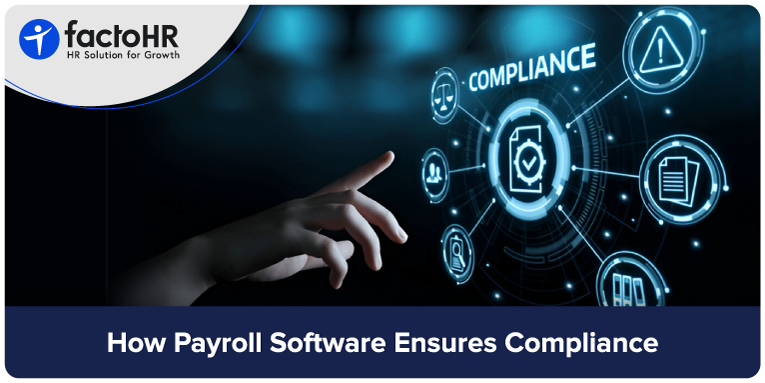How Payroll Software Ensures Compliance

Table of Contents
One missed update in labor law could mean penalties, but with innovative payroll software, staying compliant is easier than ever. Payroll compliance means ensuring that an organization follows all legal and regulatory laws related to employee compensation.
This includes adhering to wage laws, properly handling tax withholdings, managing benefits, maintaining accurate records, and meeting employment standards at the Central, state, and local levels. Payroll compliance has become increasingly challenging due to the constant changes in tax laws, labor codes, and statutory filings.
That’s when payroll software offers the solution. Automating calculations, updates, and reporting ensures businesses stay aligned with legal requirements, accurately and efficiently. In this guide, we will explore how payroll compliance software can efficiently handle the complex legal and statutory tasks.

Compliance Areas Handled by Payroll Software
1. Statutory Deductions and Tax Compliance
Calculating and deducting mandatory contributions is one of the most essential duties for a payroll system. Payroll software is reliable for managing this process.
- It calculates and deducts income tax, Employee Provident Fund (EPF), Employee State Insurance (ESI), and professional tax.
- Generates timely statutory forms such as Form 16 and Form 24Q.
- Ensures seamless TDS deductions and filings by tracking each employee’s salary and applicable tax slab.
- Supports real-time compliance with Indian tax laws by adjusting to changes in tax regimes automatically.
Having most tasks automated reduces the chances of error and avoids the risk of penalties due to late or incorrect filing.
2. Labour Law and Wage Regulation Compliance
Payroll compliance software plays a vital role in aligning payroll processing with labour law requirements.
- Ensures payment of minimum wages as mandated by the state and central government.
- Accurately calculates overtime and compensates employees based on predefined rules.
- Makes the necessary adjustments to the Indian Labour Law Code promptly, changing wage rates and calculations without manual intervention.
3. Employee Classification and Contractor Compliance
It is essential to determine the type of employee you have for payroll purposes. Each type of employee has different benefits, entitlements, and legal requirements. Misclassifying employees can lead to penalties, back payments, and compliance issues.
- Payroll software classifies employees as full-time, part-time, temporary, or contractual.
- Automatically applies the correct tax rules and benefits to each category.
- Ensures compliance with relevant social security contributions and tax deductions based on employment type.
This classification also helps organizations manage contract worker compliance, a critical aspect often overlooked in manual payroll processing.
4. Recordkeeping and Audit Readiness
Government authorities often require organizations to maintain payroll records for several years.
- Payroll compliance software stores all payroll records digitally and securely.
- Maintains trails of changes, approvals, and processing history.
- Simplifies internal and external audits by generating audit-ready reports with just a few clicks.
Digital documentation is not just efficient—it’s critical during labor inspections and financial reviews.
5. Local and Global Compliance Features (for Multinational Firms)
Businesses operating in multiple jurisdictions need software that can adapt to various laws and regulations.
- Payroll software offers multi-country compliance features, adjusting to local tax laws and labour codes.
- Supports country-specific statutory filings and generates reports in required formats.
- Offers multi-currency and multilingual interfaces to ease global payroll management.
Multinational firms benefit from standardized yet localized payroll processes that meet both headquarters and regional requirements.

How Payroll Software Ensures Compliance – Step-By-Step
To understand how payroll software ensures compliance, we must first identify its operational functions.
1. Real-Time Updates on Regulatory Changes
The payroll rules are constantly changing. Whether the government creates a new budget or modifies existing policies, staying up to date helps the company remain compliant.
- Modern payroll software tools automatically update tax slabs, PF ceilings, and other statutory parameters.
- Updates in real-time and reflects the latest legal amendments without any manual input.
- This assures that companies remain compliant without having to monitor the government gazette daily.
2. Pre-Configured Rules and Validations
Another strength of payroll software is its built-in intelligence.
- Payroll compliance software has a standard salary structure, defined deductions, and validation rules.
- It highlights mistakes in employee payroll, such as salary errors, extra deductions, or a negative total pay.
- It limits mistakes that could lead to problems or disagreements with people.
3. Automated Report Generation
Timely and accurate documentation is central to payroll compliance.
- Payroll software automatically generates statutory reports like payslips, TDS challans, EPF statements, and Form 16.
- It also supports the creation of payroll registers, management information system (MIS) reports, and return filings required by tax and labor departments.
- The reports are created according to regulations, which means they do not require manual formatting.
4. Seamless Integration with HR, Accounting, and Government Portals
Keeping data in separate silos often results in delays and errors. Using payroll software significantly reduces the gap.
- It integrates with HRMS, accounting platforms, and statutory portals (like EPFO and the Income Tax Department).
- Facilitates real-time data sync for e-filing and monthly or quarterly submissions.
- Eliminates unnecessary data entry and ensures end-to-end accuracy in reporting.
This integrated ecosystem makes compliance not only achievable but also sustainable.
Benefits of Using Payroll Compliance Software
Increasing regulations necessitate the use of software to adhere to best payroll practices and ensure compliance with regulations.
Due to increasing regulations, following payroll best practices means using software to ensure compliance.
- Minimises Legal Risks: Automated compliance reduces the likelihood of costly errors, missed deadlines, and fines.
- Saves Time and Resources: Eliminate the need for manual calculations and repetitive form filling. Automation frees up the HR team to focus on strategic tasks.
- Builds Employee Trust: Accurate deductions, timely payslips, and error-free TDS returns foster employee confidence.
- Scales with Business Growth: As the company expands into a new state or another country, compliance software easily adapts to new regulations.
- Supports Audit Preparation: With detailed digital logs and pre-built reports, audits become quicker and less stressful.
Platforms like factoHR stand out in this domain by offering a built-in payroll compliance engine that aligns with changing regulations, reducing HR overhead and risk exposure.

Manual Payroll vs Payroll Compliance Software – Quick Comparison
| Manual Payroll | Payroll Compliance Software |
|---|---|
| Error-prone, delayed | Automated, on-time |
| Siloed processes | Fully integrated |
| Costly in the long run | Cost-effective over time |
| Difficult to track changes | Real-time updates and alerts |
| High risk of non-compliance | Ensures ongoing compliance |
| Complex tax calculation | Built-in tax compliance |
| Limited Scalability | Easily scales with growth |
How to Choose the Right Payroll Compliance Software
Selecting the right tool can significantly impact an organization’s ability to stay compliant efficiently. Here’s what to consider:
- Auto-Updates: The software must regularly update itself with the latest legal rules.
- Integration Capabilities: Select systems that can integrate with HRMS, financial solutions, and portals of government agencies.
- Customization: Choose platforms that offer adaptable salary structures, deduction rules, and flexible reporting.
- Compliance Support: The vendor should promptly inform customers about changes and their associated legal implications and offer customer assistance as needed.
- Certifications and Data Security: Ensure that the platform you use can certify its data protection by meeting standards like ISO 27001, SOC 2, and GDPR.
Want a solution that ticks all the boxes? factoHR’s payroll software is designed to help HR teams navigate payroll compliance with accuracy, efficiency, and peace of mind.
Common Payroll Compliance Mistakes You Can Avoid
While automation helps, it’s equally important to be aware of common errors that can derail compliance efforts.
- Employee Misclassification: Incorrectly treating a contractor as a full-time employee (or vice versa) can lead to serious tax issues.
- Missing TDS Deadlines: Late tax payments attract penalties and damage reputation.
- Incorrect PF/ESI Calculations: Manual errors in applying the correct rate or limit can invite legal scrutiny.
- Poor Documentation: Incomplete or disorganized payroll records make audits and inspections difficult.
Final Thoughts
Payroll compliance is a mandatory requirement for all businesses. The potential for unwanted fines, employee discontent, and damage to reputation is too significant to overlook. With payroll compliance software, processes become simpler, and each payment can be found and recorded.
Failing to address compliance issues until they happen can be more damaging than expensive; it might harm your company’s reputation. Therefore, this is the best way to start automating payroll operations.
For organizations that want to stay up to date with regulations, factoHR’s payroll compliance software does this by automating tasks, keeping everything accurate, and adapting to new rules. Instead of following compliance, try to lead it.

FAQs about Payroll Compliance Software
1. What is Payroll Compliance Software?
With payroll compliance software, payroll processing is automated and remains compliant with tax, labor, and reporting regulations. This technology helps prevent errors, penalties, and manual administration.
2. Can Payroll Software Handle Multiple State Regulations?
Yes, it is best for companies operating in multiple countries. Different countries have different laws and regulations. Payroll Compliance Software assures compliance with these laws and regulations.
3. How Often are Tax and Compliance Rules Updated in Payroll Software?
As the government passes a new law or new budget, the tax and compliance are updated immediately.
4. Is Payroll Compliance Software Suitable for Small Businesses?
Yes, small businesses can utilize this software, as it simplifies compliance issues, allowing companies to focus on growth.
5. How does It Help in Audit Preparation?
Payroll software maintains accurate and time-stamped records, and these reports are designed for easy auditing and review. It streamlines the data collection process and ensures compliance with all applicable regulations.
Grow your business with factoHR today
Focus on the significant decision-making tasks, transfer all your common repetitive HR tasks to factoHR and see the things falling into their place.

© 2026 Copyright factoHR


